Behind The Scenes Of Nicolas Cages The Wicker Man
One from the TF archives…
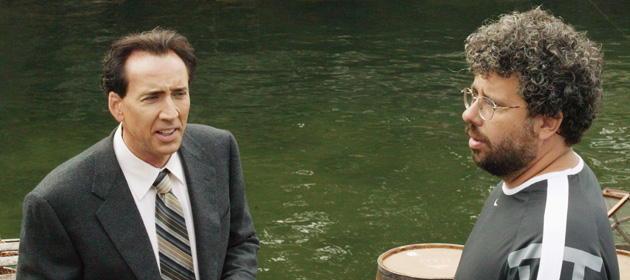
Revisiting The Revisit
We thought it’d be interesting to journey back to a time, many issues ago, to when we chatted to Neil LaBute’s about his ‘upcoming’ Nicolas-Cage-starring remake of The Wicker Man , a film that has since become one of the most reviled of the last century. Join us as we turn back the clock…
Gender-baiting controversy magnet Neil LaBute is at it again, remaking cult horror The Wicker Man – with bees, chastity and Nicolas Cage. And this time the villains have breasts.
They’re calling The Wicker Man Neil LaBute’s first horror film. They’re wrong. It’s just his latest. Since the day that one of his early university productions caused an outraged audience member to yell, “Kill the playwright!”
LaBute has been horrifying people for years. Usually those short a Y chromosome.

Neil LaBrute
His debut, yuppie revenge drama In The Company Of Men , saw two corporate wolves scheming to rip out the heart of an innocent deaf typist. “Trust me, she’ll be reaching for the sleeping pills within a week,” smirked Aaron Eckhart. “And we’ll be laughing about this until we are very old men.”
The film won him a Filmmaker’s Trophy at Sundance and a rubber-stamp for brutal misogyny. LaBute’s response? An even crueller follow-up in Your Friends & Neighbors , culminating in Catherine Keener’s glacial power-bitch being memorably decimated by Jason Patric. “You…” breathed Patric, “are a useless cunt.”
That was it. He was Neil LaBrute , the Mormon misogynist, the suave, savage architect of lacerating anti-date movies in which male characters channel anger and sadism towards women.
So news that he was remaking one of British cinema’s most unique and cherished chillers was a head-scratcher.
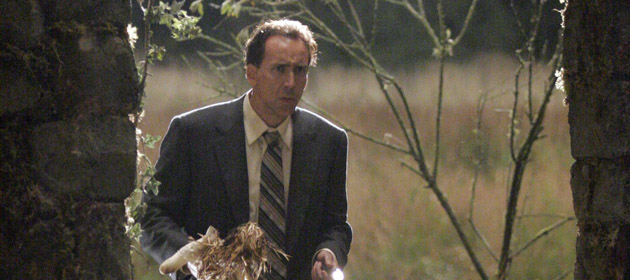
Taking The Heat
It certainly riled Robin Hardy, enough for the director of the 1973 classic to scrub his name from any promotional material. Actress Ingrid Pitt, star of the original, spat, “I can’t stand the idea of a new version. I won’t be seeing it. I think it’s a crime.”
By LaBute’s standards, that’s borderline flattery. And, as usual, the director doesn’t mind taking the heat. “I’m trying to go my own way,” he tells Total Film , in relaxed mood as he takes a break from the final post-production tweaks.
“I love The Wicker Man for what it is – you know, this wonderful, singular cult classic. I just thought there could be a different take, moving away from the Christian and Pagan and dealing with things that are interesting to me. It doesn’t do a lot of things that people associate with a horror film. It doesn’t take place at night. There are no monsters or killers.”
Unless you count the women.
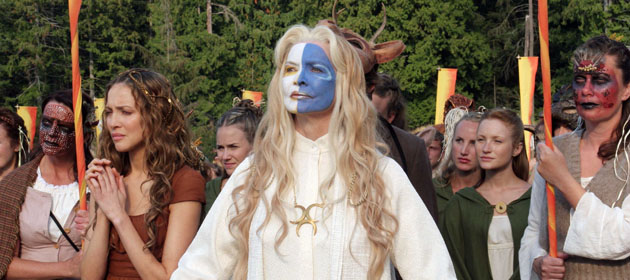
Masculine Fear
Make no mistake: with his The Wicker Man redux, the 43-year-old writer/director resumes rank as Field Marshall of the Gender War. Beginning with a car-crash (like LaBute’s career – his debut was funded with insurance money), the film sees Nicolas Cage’s US traffic cop searching the remote Summerisle for a missing girl.
But LaBute’s Summerisle is no longer inhabited by Pagan hippies. It’s inhabited by women – a matriarchal society of duplicitous harpies all hatching Cage’s fiery demise. LaBute, to be sure, is asking for it.
As a delicious arc, you can’t beat it: from the first-degree emotional murder of women to first-degree murder by women. “This male-female power shift, a kind of emasculinisation... I think I’m touching on that more than anything,” explains LaBute of his gender twist.
“I think there’s a certain masculine fear that’s the root of a lot of the women’s movement over the last 30 or 40 years.” Another battle of the sexes, then. “Well, I don’t know if there’s much of a battle,” he grins slowly. “Because Nic loses pretty soundly. That remains the same.”
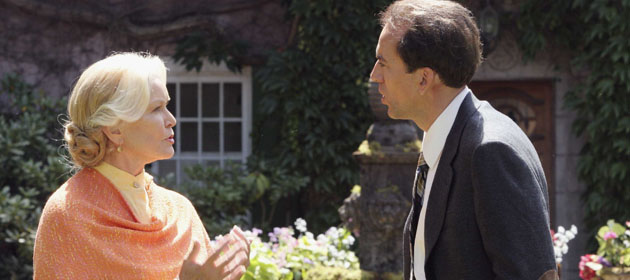
Manufactured Reality
LaBute has found a terrifying (and terrifyingly obvious) symmetry between his world and The Wicker Man ’s. Themes of power, failure and humiliation. A horror of duplicity, betrayal and role-playing. An existence based on a manufactured reality. A whiplash ending.
“You can only kill someone once,” the director once noted, “but you can hurt them every day of the week.” Indeed, trapped in the claws of Summerisle’s twisted sisters, Cage’s policeman is in for a diabolical pasting.
“He certainly has more to deal with than Edward Woodward,” nods LaBute. “The industry of the original Summerisle was apples. Here we’ve changed it to honey and bees. There was something fairly innocuous about apples, but with bees, every step on the island could be dangerous. He becomes more and more on his own and the power of the women begins to grow...”
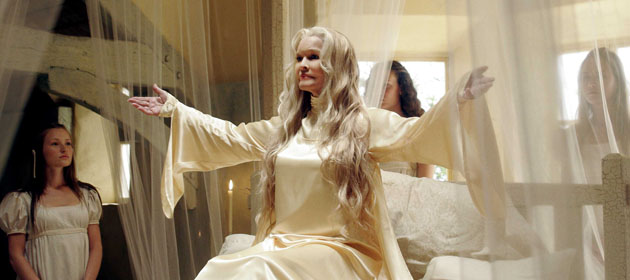
Queen Bee
And the Queen Bee? That would be Ellen Burstyn, stepping into Christopher Lee’s shoes as ‘Sister’ Summerisle.
“You see her less than you see Christopher Lee’s character,” reveals LaBute. “She’s more of a Colonel Kurtz. You go up stream, from place to place, to get to her and then finally there she is. She is really at the centre of everything, so sure of her power and her beliefs that she is unshakeable. It’s very unnerving. And there’s the lineage all the way back to The Exorcist , which is kind of wonderful.”
Unless, of course, you’re a lost copper with a bee allergy. LaBute’s Wicker women certainly packed too much sting for the US censor.
“Some torture towards the end of the movie ended up just getting cut,” he admits. “There was a kind of purifying ritual they put Cage’s character through before they take him to the wicker man. They broke his knees and they put a helmet of bees on his head. He was stung, virtually to death, then brought back with an adrenaline shot – only to be hauled up by his legs in the wicker man. It was a pretty savage, wonderful section.”
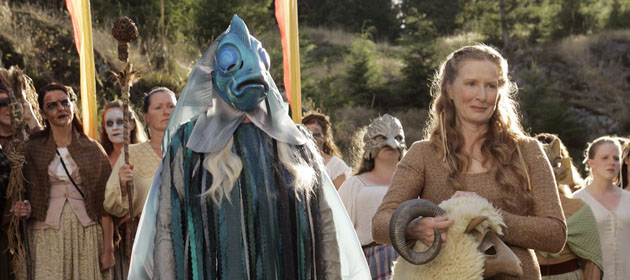
All About Eve
Wonderful? Given LaBute’s misogynist rep, you might wonder if Cage isn’t the only one set to be burnt alive. But he’s been here before: deflecting accusations of misogyny with claims of misanthropy, skepticism rather than cynicism.
Then came The Shape Of Things and Rachel Weisz’s demonic ball-breaker, a world-class manipulator with an appetite for male destruction.
Clearly, LaBute’s critics affirmed, this was a man who hates women, fearing their evolution all the way back to Eve. He just wants to get even for Eden. As far as The Wicker Man ’s women, LaBute just shrugs it.
“Women as villains?” he ponders. “You know, I really can’t do that. I can’t do that to the characters. I leave that up to the experience of the audience. Everybody is going to have a different idea about it from what they bring to it. But I have to find a way in where I can at least understand them and not judge them.”
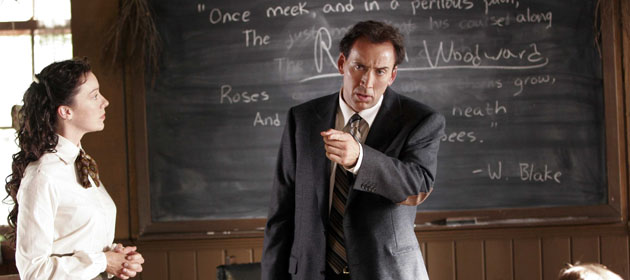
Social Dissector
Cagey, isn’t he? Often dubbed as cold, clever and manipulative as his characters, LaBute is near impossible to lock down on a personal level. It’s ‘ Your ’ Friends & Neighbors , remember. Not Our , not My .
An academic Anglophile, a convert to practising Mormonism (“I need more practise, apparently”) and Mametism, LaBute never answers to or apologises for his characters.
Even more confusingly, this vicious social dissector – whose stage-plays tackle incest, infanticide and 9/11 – initially wanted to pen sketches for Saturday Night Live . He’s happily married to his psychotherapist wife, with whom he has two children.
He learned the rules of the Gender War sat in the backseat of his parents’ car, listening to them argue. “My father was a professional truck driver,” he once said. “And a part-time son of a bitch. I’ve tried to do as much as possible to distance myself from him.”
On the flip-side, then, this is LaBute doing it for the girls – practically a revenge-pic inversion of In The Company Of Men .
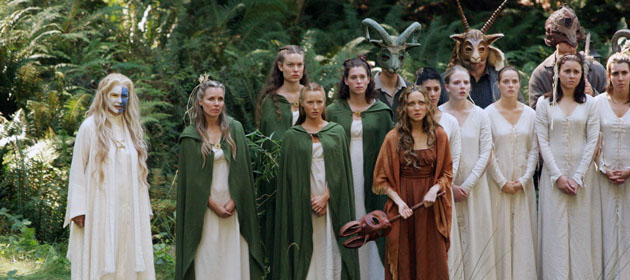
The Feminist Hero
Empowered by a new sense of social order, Summerisle’s matriarchs are textbook New Wave feminists. And the twist of Hardy’s original, of course, was the unsettling semi-sympathy we share with the Summerislanders as much as the spectacularly dispatched Woodward. Maybe this is it: LaBute, the feminist hero.
“I welcome that with open arms!” he laughs. “It’ll be interesting. I’m never surprised by what people call things. In a wonderful way. Women can be just as duplicitous and clever as men are. I just imagine that they would do it differently.”
Will we walk out of LaBute’s Wicker Man with a healthily increased respect for womankind? Has he? “Um… loaded question! My level of respect and fear is always very healthy. No doubt they will have more to talk about than if they had watched a straight horror film.”
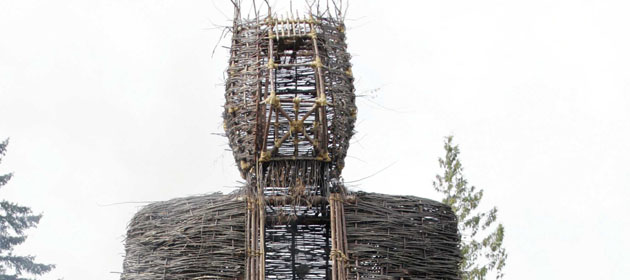
Battling The Elements
Just how straight a horror film The Wicker Man will be also hangs on how LaBute busts clear of his chamber-piece roots. In The Company Of Men was shot in 11 days for $25,000. The Shape Of Things is four characters and 10 scenes.
For a man unashamedly enraptured with the theatre (“Someone once asked me to adapt one of my plays for the screen. I just typed ‘Fade In’ and handed it back to them”), the $40-million budget, mobile cameras and Vancouver’s outdoor terrain was a major technical grapple.
“It definitely was a challenge,” he admits. “In the theatre, you rarely do battle with the elements. No wind, no rain, no sunset – unless, of course, you ask your designers for them. But I’d done action before on Nurse Betty, we have some great special effects and for the whole sacrifice thing, we ended up burning a 50-foot wicker man – for real.”
Ah, the ending. Which forces the bigger question: how to remix a twist movie in which everyone knows the twist?
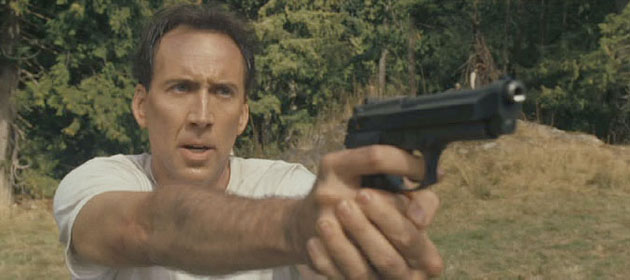
The Birds And The Bees
Again, LaBute remains equivocal. “I think that for people who know it, there’ll be a sigh of relief: ‘Thank God he didn’t fuck up the ending.’ And those who don’t know it will hopefully be as surprised as I was when I first saw it.”
However, in a movie ostensibly pinned on the birds and the bees, there’s one obvious omission to LaBute’s PG-13 rated thriller. Back in 1973, naked innkeeper’s daughter Britt Ekland pounded Woodward into a frenzy of lust and guilt. LaBute has already come clean that Cage’s cop is no virgin and a Dionysion island with 21st Century women must be positively squirming. But…
“It’s not quite as wild as that,” admits LaBute. “For all the women we have, there is less of the ’70s sexuality. There are no naked people bouncing around.”
No sex? That sounds like bad news. “Well, you know what? It makes it different. I couldn’t come up with an equivalent to the scene with the multiple people coupling on the square.”
But that’s terrible news! LaBute laughs. “Well, you always have the original to go back to. What I think we have done is create something as singular as the original.” He thinks for a second.
“I also don’t have nearly as many songs. It’s surprising how many people say it’s their favourite soundtrack. I’m like, come on! You may not like the new one, but if that’s your favourite soundtrack, I don’t know if I want you to like my film…”
This feature originally appeared in previous issue of Total Film magazine. To subscribe, click here .
The Total Film team are made up of the finest minds in all of film journalism. They are: Editor Jane Crowther, Deputy Editor Matt Maytum, Reviews Ed Matthew Leyland, News Editor Jordan Farley, and Online Editor Emily Murray. Expect exclusive news, reviews, features, and more from the team behind the smarter movie magazine.
Weekly digests, tales from the communities you love, and more
You are now subscribed
Your newsletter sign-up was successful
Want to add more newsletters?

Every Friday
GamesRadar+
Your weekly update on everything you could ever want to know about the games you already love, games we know you're going to love in the near future, and tales from the communities that surround them.

Every Thursday
GTA 6 O'clock
Our special GTA 6 newsletter, with breaking news, insider info, and rumor analysis from the award-winning GTA 6 O'clock experts.

Every Friday
Knowledge
From the creators of Edge: A weekly videogame industry newsletter with analysis from expert writers, guidance from professionals, and insight into what's on the horizon.

Every Thursday
The Setup
Hardware nerds unite, sign up to our free tech newsletter for a weekly digest of the hottest new tech, the latest gadgets on the test bench, and much more.

Every Wednesday
Switch 2 Spotlight
Sign up to our new Switch 2 newsletter, where we bring you the latest talking points on Nintendo's new console each week, bring you up to date on the news, and recommend what games to play.

Every Saturday
The Watchlist
Subscribe for a weekly digest of the movie and TV news that matters, direct to your inbox. From first-look trailers, interviews, reviews and explainers, we've got you covered.

Once a month
SFX
Get sneak previews, exclusive competitions and details of special events each month!


